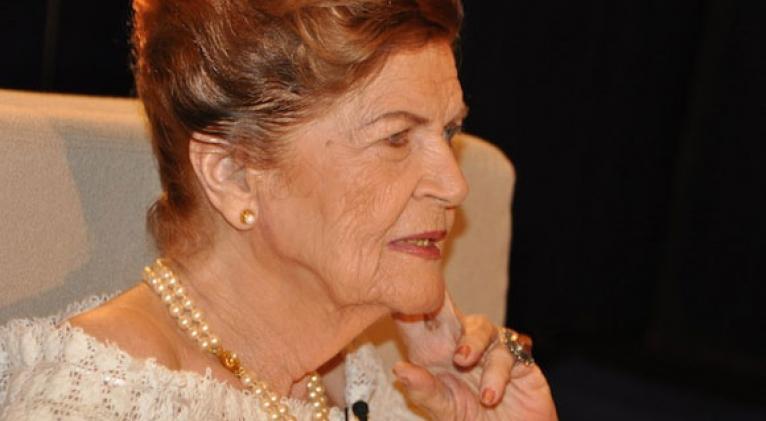100th anniversary of Carilda Oliver Labra: a woman, a city
especiales

Carilda Oliver Labra wrote, in a popular poem to her city: Matanzas: I bless here / your wet esplanades, / the banished trees / of Paseo de Martí/ and the echo in the Yumurí. / And my tears go, they go/ like pearls with magnet / or like cowardly mirrors / to empty every afternoon / its waters in the San Juan.
She lived and worked all her life in Matanzas; she made her name of romantic and passionate poetess, who fall in love with the things and spirits of her home town there.
But the city loved her back: the city worshipped her as a living monument, a symbol and emblem of a culture, to the point that we cannot talk about Matanzas without talking about Carilda, and vice versa.
Her house, on Tirry Avenue, became a space for fantastic social gatherings, in which all the arts converged. She welcomed there, almost until the end, all her fans and so many people who wanted to pay tributes to her.
Carilda Oliver Labra was a popular poetess; that is the greatest privilege of good poets: to offer their verses as a heritage to others, multiple chronicles, shared feelings. There are poems written by Carilda that are part of the essential heritage of Cuban poetry, and of the living heritage of the people.
How many in Cuba are unaware of these memorable verses? I mess up, love, I mess up/ when I'm in your mouth, delayed;/ and almost for no reason, almost for nothing, / I touch you with the tip of my breast.
She was a poet of abductions and fascination, but her poetry was greater. She was powered (her poetry actually is, since it is eternal) by underground winds, roots that fed up from the great lyrical tradition of her city, her country, the immense Latin American poetry. On one hand, the great collection of her Matanzas, city of great poets; on the other, the immense heritage of Cuban culture; and also, no less important, her close ties, in fact, her belonging to a unique field of Latin American poetry: the work of great poetesses (Gabriela Mistral, Juana de Ibarbourou, Dulce María Loynaz).
In so many and so beautiful verses, Carilda skirted the ineffable keys of love.
Some underestimated that lyrical torrent. They believed it to be mere sentimental gloating, romantic dalliance... and failed to glimpse its deep roots.
Love and death have been, perhaps, the greatest motives of universal poetry, Carilda chose —above all— love, with its eternal ups and downs, with its abductions and fascination, but also with the blows or caresses of melancholy, or the exultant memory of passion.
She wrote: Last night I slept with a man and his shadow. / The constellations know nothing about it. / His kisses were bullets that I taught how to fly... and there were those who basked in the confession of an erotic adventure, but it was more, and her best readers noticed: it was the strength of a feeling turned into a metaphor, it was the rich and loose flow of her femininity.
In times of deceitfulness and moralizing, Carilda Oliver Labra looked straight ahead, diaphanous and serene.
However, she should not be circumscribed: her work opened up to multiple landscapes: filial love, historical evocation, pride for the country...
In 1957, during the tough years of Batista's regime, she wrote another of her best-known poems: I am not going to name the East, / I am not going to name the Sierra, / I am not going to name the war/ —painful, different light—, / I am not going to name the forehead, / the forehead without a string, / the forehead for the laurel, / the lead and grape forehead:/ I am going to name all of Cuba:/ I am going to name Fidel.
She lived as she wanted, without petty-bourgeois ties; live, feel, love as a free woman… and write it, leave testimony, recreate her circumstances with a profoundness and a truth that moved (move still) thousands of readers.
These verses could represent all: When my grandmother came / she brought a bit of Spanish soil, / when my mother left / she brought a bit of Cuban soil with her. / I will not keep with me any bit of homeland:/ I want it all/ on me grave.
Foreign to literary cliques, intrigues and revenge, she devoted herself to her poetry and the cult of hospitality. When some tried to silence her, she stood still, with the certainty that a poet can be an island: she was a prodigal and open island.
Carilda received great tributes from her nation: The National Prize for Literature, the Félix Varela Order… but she always treasured, even in the years of relative silence, the affection and respect of her readers, who are the people.
She was always the eternal girlfriend of Matanzas.
Translated by Sergio A. Paneque Díaz / CubaSí Translation Staff














Add new comment